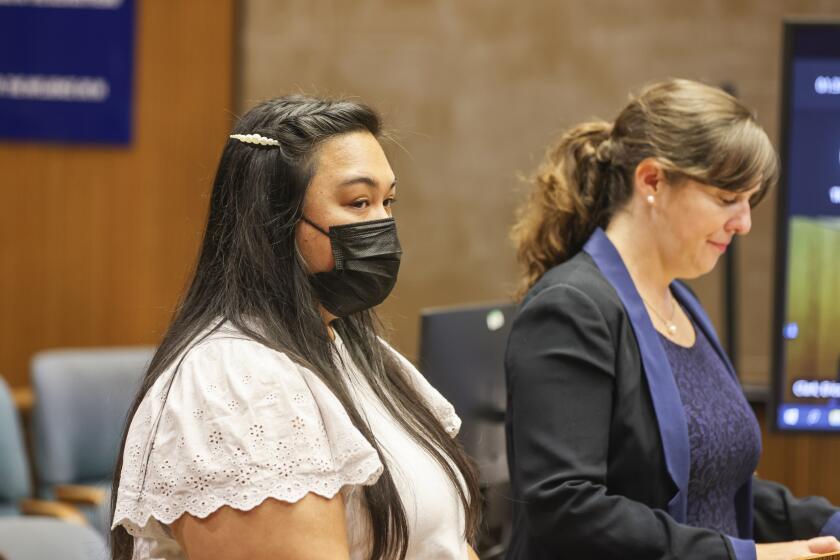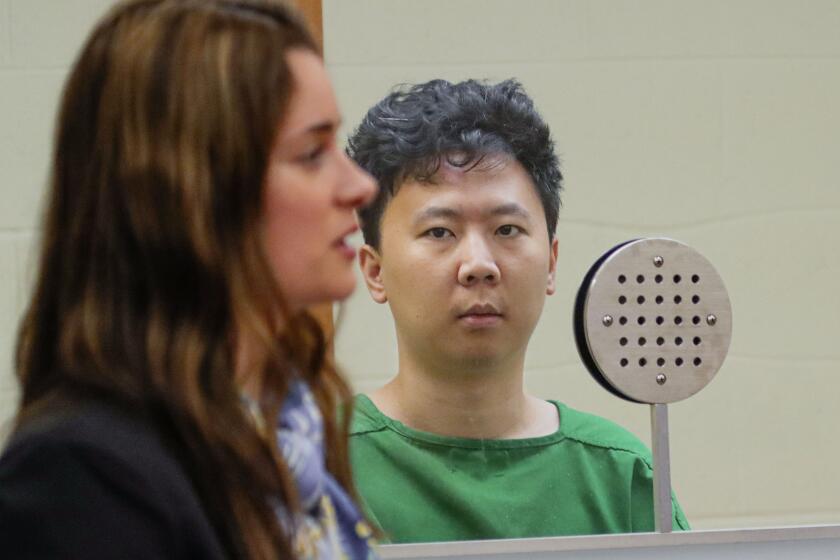After jury deadlocks, prosecutors dismiss case against doctor accused in woman’s jail death

Prosecutors sought the dismissal of the case less than a week after an El Cajon jury deadlocked 9-3 in favor of acquitting Dr. Friederike Von Lintig, the doctor on duty the day 24-year-old Elisa Serna died
A manslaughter charge was dismissed Wednesday against a doctor accused in the 2019 death of a woman in a Santee jail, bringing an end to a rare instance of medical staffers charged in the death of an inmate.
Prosecutors asked El Cajon Superior Court Judge John Thompson to dismiss the sole count of involuntary manslaughter that Dr. Friederike Von Lintig had faced in the death of 24-year-old Elisa Serna, who collapsed and died Nov. 11, 2019, less than a week after she had been booked into Las Colinas Detention Facility.

The decision to drop the case was not a surprise. On Friday, an El Cajon Superior Court jury deadlocked 9-3 in favor of acquitting Von Lintig, who was the doctor on duty the day Serna died. It was the only day Von Lintig had tended to Serna, and her shift ended more than three hours before Serna was found dead in her cell.
The same jury that deadlocked over Von Lintig’s case acquitted co-defendant Danalee Pascua, a nurse who left Serna collapsed against a wall about an hour before she was found dead. The two defendants were charged a year apart — Pascua in 2021, Von Lintig in 2022 — but were tried together.
While the dismissal ends the criminal case, Serna’s family is still pursuing a civil case in federal court. The next hearing in that case is set for next month, when a trial date may be set.
Von Lintig’s attorney, Dana Grimes, said the doctor had been “vindicated” by the jury and the dismissal of the criminal case.
“Dr. Von Lintig is a loving and caring doctor who was devastated by the unexpected loss of Ms. Serna, who was her patient for one day at Las Colinas,” Grimes said.
Serna’s mother, Paloma Serna, said Wednesday that she was disappointed with the result, and that she remains “determined to see justice prevail” for her daughter and others who die in custody.
“We have to fight. We are still fighting,” she said. “We are determined. What’s right is right, and what’s wrong is wrong.”
The District Attorney’s Office said Serna’s death “was a tragedy that did not have to happen.”
“When our team of prosecutors and investigators reviewed the case, we determined that criminal negligence substantially contributed to her death,” the office said in a statement Wednesday.
“(W)hen a life is in the custody and care of government, it must be safeguarded and provided with the appropriate medical care,” the statement added.
Prosecutors argued to the jury that the doctor and nurse had each failed to act and failed in their duty to care for Serna, who was five-weeks pregnant and suffering from withdrawal of alcohol and narcotics.
When she was booked into jail, Serna told jail staff that she had used heroin within two hours of her arrest. But four days passed before she was started on a withdrawal protocol and put into the medical unit.
While there, Serna collapsed several times and had two seizures the day she died. After the second seizure, medical staff summoned Von Lintig, but the doctor did not go to the cell to check on Serna.
Hours later, Serna collapsed against a wall inside her cell while Pascua — there to check Serna’s vitals signs — was outside the door. The nurse entered but was unable to take Serna’s vital signs, and she left with Serna still slumped against the wall. An hour later, Serna was found dead in the same spot.
A deputy medical examiner with the county testified that Serna died from complications of polysubstance abuse.
During closing arguments Feb. 6, the defense attorneys argued that their clients did not know how sick Serna had been and did not have a complete picture of what had been going on in the days leading up to Serna’s death.
Serna had been unstable, walking into walls and collapsing inside her cell throughout her last day — behavior recorded on closed-circuit footage but not witnessed by staff. The jury saw that footage, and also saw footage of Serna collapsing at the feet of a deputy just outside her cell in the medical unit. The deputy dragged Serna — who appeared to be unresponsive — back inside her cell and left her on the floor. It happened several hours before she died and was not reported in her chart.
At trial, the defendants’ attorneys each put the blame on the Sheriff’s Department, arguing the criminal case deflected from systemic problems inside the jails it runs. A report from the California State Auditor, prompted in part by a 2019 Union-Tribune investigation into jail death rates, found 185 people died in local jails between 2006 and 2020 and recommended several fixes. The Sheriff’s Department has said it is working to address concerns, including reforms to medical services.
Attorney Julia Yoo, who represents Serna’s family, said the federal civil suit will hold the defendants — including the Sheriff’s Department — accountable “for their horrific and unimaginable mistreatment of Elisa Serna.”
In a criminal case, the prosecution must prove guilt beyond a reasonable doubt. And in a case of involuntary manslaughter, the prosecution must prove the defendants showed reckless indifference to life or criminal negligence.
In a civil case, like the case the Serna family has brought, the standard is lower — a preponderance of the evidence, essentially that an allegation is more likely to be true than not true.
The latest news, as soon as it breaks.
Get our email alerts straight to your inbox.
You may occasionally receive promotional content from the San Diego Union-Tribune.






